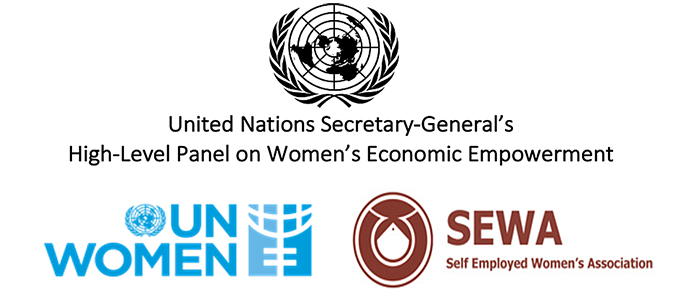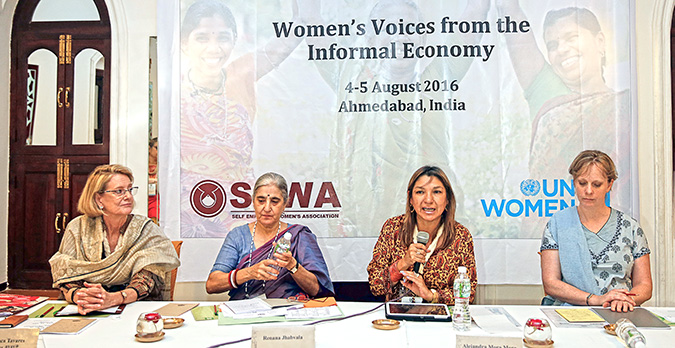UN Panel hears from women in the informal economy
Date:
[Press Release]

- Members of the UN Secretary General’s High-Level Panel on Women’s Economic Empowerment meet women workers and entrepreneurs to understand challenges, learn about solutions
- Panel will submit a global report providing recommendations for actions that can be taken by governments, the private sector, civil society and the UN system to achieve the Sustainable Development Goals which call for the economic empowerment of women
Ahmedabad, India – UN Women and the Self Employed Women’s Association (SEWA) jointly hosted a global consultation on ‘Women’s Voices from the Informal Economy’ on 3-4 August at Ahmedabad, India, as part of the UN Secretary-General’s High-Level Panel (HLP) on Women’s Economic Empowerment.

The event brought together eminent experts on economic empowerment and women informal workers who have organized to form producer groups and collectively advocated for legal reform, social protection and financial inclusion. “Despite the legal guarantees for employment, women’s participation in the economy in India continues to remain low—and is in fact declining—due to structural barriers that prevent women from entering and growing in the workforce on equal terms,” said Dr. Rebecca Reichmann Tavares, Representative, UN Women India in her opening address. “UN Women works to create an enabling environment to strengthen informal workers’ organizations through dialogue and advocacy. We believe in the power of collective action as the most effective means of moving forward, and we are hopeful that the High-Level Panel’s work will help strengthen our work locally in India and use success stories from the sub-continent as good practice examples that can be shared globally,” Dr. Tavares added.
Participants at the consultation included Alejandra Mora Mora, Minister for the Status of Women, Costa Rica; Gwen Hines, International Director, UK Department for International Development (DfID); Meg Jones, Chief of Women’s Economic Empowerment, UN Women; Panudda Bonapala, Country Director, International Labour Organisation (ILO); and Geoff Wain, Deputy High Commissioner to India, British High Commission.
The UN High-Level Panel was announced in January 2016 to mobilize global action to strengthen women’s participation in economic activity. Chaired by the President of Costa Rica and the CEO of IKEA, Switzerland, the Panel includes the leaders of the International Monetary Fund, World Bank Group, UN Women and a range of gender equality actors, economics experts, academics, trade union leaders, business and government representatives from all regions.
The consultation in Ahmedabad provided an opportunity for Panel members to learn first-hand from women workers about the issues they face and the solutions they have implemented. “The SEWA-UN Women consultation has been designed to provide deep insight into the lives of women at the grassroots,” said Renana Jhabvala, National Coordinator of SEWA and member of the UNHLP. “The core aim of this consultation is to hear the voices of the invisible—what is their perspective on economic empowerment? Their inputs will go a long way in shaping policies that are meant to usher them into the mainstream,” she added.
The dialogue sessions in the field visit modules principally focused on four areas: financial, inclusion, women-owned enterprises, skills and adolescent girls, legal barriers and care work. Pay and work conditions were a cross-theme addressed throughout the discussions.
The first module on Financial Inclusion took some of the participants to Rakhiyalis, a neighborhood in the eastern part of Ahmedabad, wherein currently SEWA has organized 26,400 members, and the major trades are incense stick makers, Beedi (thin local cigarettes), embroidery workers, block printing and vegetable and fruit vendors. “I develop new designs for stationary products and train hundreds of waste recyclers like myself, and link them with decent livelihoods. Thus we are the owners, users and managers of our own cooperative with gives us collective strength. Our cooperative supplies stationary items to global brands like Staples, and my dream is to not only upgrade Gitanjali Cooperative but also have our own paper mill” shared Paliben, a master trainer in Geetanjali Waste Pickers Cooperative Society.
The field visits included an Integrated Module in the District Anand (about 50 km south-east of Ahmedabad) where participants visited and held a consultation in a multi-sectoral setting on women’s social enterprise, weavers, care givers, and financial inclusion. Anand district currently has a total of 1,500 cooperative groups in trades of tobacco, weaving, agriculture, and sapling growing. Weaving work in Anand started in 1994 by SEWA, and there are currently 11 groups of 475 weavers, and of the 170,000 SEWA members in Anand 2,500 are saving.
A total of 1,200 village members, out of a population of 6,051, are organized under SEWA in Sihol-the village visited by the HLP members. Conversations herein highlighted the transformative change in the lives of women and their community as a result of organizing under SEWA, receiving training as well as the child care centers operated by SEWA members. Reginaben, a weaver and master trainer in the village of Shihol, who joined the SEWA Gram Haat training in 1994 for upgrading her weaving skills and learning the latest trends in fashion, said “We now understand the demand and supply of a market. We don’t blindly produce goods; we try to reach a point of equilibrium.” Reginaben who never stepped out of her house and simply followed the instructions of middlemen, has now travelled to Nepal, Bhutan and Pakistan to train women informal workers there.
The consultation included technical sessions on normative and prevalent labor standards for rights of workers in the informal economy particularly ILO’s Recommendation 204, as well as trigger presentations on key issues of measuring women’s paid, unpaid and informal work, informality of women farmers in land and labor, the urban informal economy ecosystem for home-based workers, street vendors and waste pickers, and young women and girls in informal work.
The High-Level Panel consultation concluded with reflections from the HLP members and a discussion on the learning, key take-aways and recommendations for the HLP’s report to the UN Secretary-General, due for presentation in September 2016.
Alejandra Mora Mora, Minister for the Status of Women, Costa Rica, spoke about lessons learnt during the interactions with women informal workers “We have insisted that the HLP reports has the voices of women in it, and hence this consultation is particularly important- especially because of SEWA’s work in helping women understand that their work is not invisible.”
The importance of empowerment as a means of strengthening dignity and self-respect for women stood out as a common observation among the Panel members from their field visits. For example, Gauriben Ramabhai Brahman, representative and shareholder of the SEWA Trade Facilitation Centre said: “We didn’t realize the value of our skill as a means of livelihood until we were organized under SEWA. We brought a steady income into our families and this economic independence pushed changes in social customs and traditions within our community. Our skill has brought identity, self-respect and dignity”.
The need for facilitation of child care facilities and/or crèches by corporates, governments and social businesses, the recognition and redistribution of unpaid care work, impact investment particularly through incubating social enterprises, and the importance of data for monitoring and evaluation of programs were some of the key recommendations. HLP members especially acknowledged that SEWA’s work, as the largest trade union of informal workers in the world with a membership of 1.7 million women workers in 12 states of India, served as a critical best practice to draw lessons from particularly with respect to shifting towards a collective rather than an individualistic economic empowerment model, and the possibility to scale up SEWA’s International exchange programs for skill development.
Geoff Wain-Deputy High Commissioner to India concluded “The report gives us a road map for a global movement distilled from experts, volumes of evidence and public consultations with thousands of people from around the world. The challenge is to make the conclusions stick. We need actions that are memorable, transformational and deliverable. We need to connect the main stakeholders with the right opportunity.”
Elaben Bhatt, founder of SEWA, reinforced the vision of the High Level Panel on Women’s Economic Empowerment, as she evoked Gandhian principles in her inspiring closing remarks at the consultation sharing that “Nothing that compromises human values is acceptable. SEWA is not a project or a model, it is about achieving a balance between the haves and the have-nots. And so my plea to you is to put poor women at the center of economic empowerment.”
About the UNHLP
Placing women’s economic empowerment at the top of the global agenda, United Nations Secretary-General Ban Ki-moon announced the first-ever High-Level Panel (HLP) for Women’s Economic Empowerment earlier this year. Aimed at accelerating progress under the 2030 Agenda for Sustainable Development, the HLP will: (a) demonstrate leadership and commitment; (b) highlight key areas for accelerating women’s economic empowerment; and (c) make recommendations enabling governments, businesses, civil society and development partners to work together to improve economic outcomes for women and girls.
The HLP members include the CEO of IKEA Switzerland, the President of Costa Rica, leaders of the International Monetary Fund, World Bank Group, UN Women, eminent gender equality champions, economics experts, academics, trade union leaders, and business and government representatives from all over the world.
The HLP will present its first report to the UN Secretary-General in September 2016.
The Panel Secretariat is hosted by UN Women, backed by the Government of the United Kingdom and the World Bank Group.
Media contacts
Rineeta Naik (UN Women)
Phone: +91 95 605 97782
Email: [ Click to reveal ]
Monica Raina (SEWA)
Phone: +91 90 990 25893
Email: [ Click to reveal ]
Kelly Courtney (UNHLP Secretariat)
Phone: +1 617 290 9190
Email: [ Click to reveal ]
For high resolution images and social media package, go to: http://ow.ly/8RYy302Ohw6